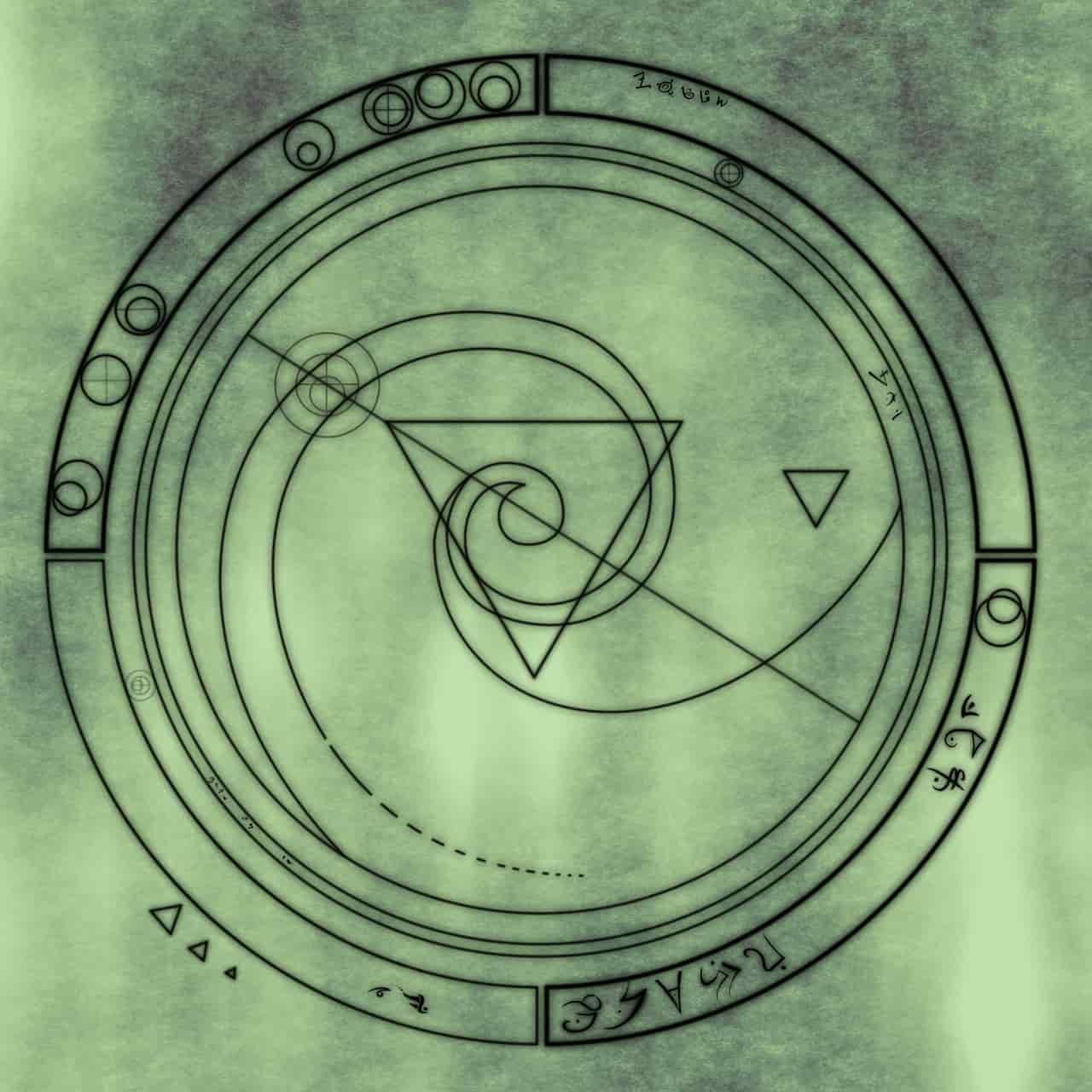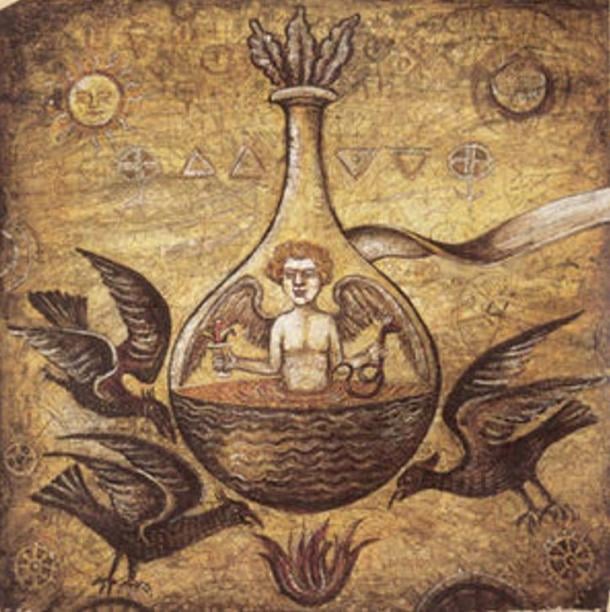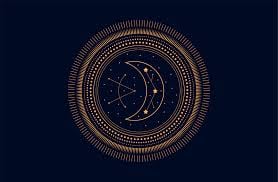Alchemy Ancient And Modern

ALCHEMY:
ANCIENT AND MODERN
CHAPTER I
THE MEANING OF ALCHEMY
The Aim of Alchemy.
§ 1. Alchemy is generally understood to have been that art whose end was the transmutation of the so-called base metals into gold by means of an ill-defined something called the Philosopher’s Stone; but even from a purely physical standpoint, this is a somewhat superficial view. Alchemy was both a philosophy and an experimental science, and the transmutation of the metals was its end only in that this would give the final proof of the alchemistic hypotheses; in other words, Alchemy, considered from the physical standpoint, was the attempt to demonstrate experimentally on the material plane the validity of a certain philosophical view of the Cosmos. We see the genuine scientific spirit in the saying of one of the alchemists: “Would to God . . . all men might become adepts in our Art—for then gold, the great idol of mankind, would lose its value, and we should prize it only[2] for its scientific teaching.”[6] Unfortunately, however, not many alchemists came up to this ideal; and for the majority of them, Alchemy did mean merely the possibility of making gold cheaply and gaining untold wealth.
[6] “Eirenæus Philalethes”: An Open Entrance to the Closed Palace of the King (see The Hermetic Museum, Restored and Enlarged, edited by A. E. Waite, 1893, vol. ii. p. 178).
The Transcendental Theory of Alchemy.
§ 2. By some mystics, however, the opinion has been expressed that Alchemy was not a physical art or science at all, that in no sense was its object the manufacture of material gold, and that its processes were not carried out on the physical plane. According to this transcendental theory, Alchemy was concerned with man’s soul, its object was the perfection, not of material substances, but of man in a spiritual sense. Those who hold this view identify Alchemy with, or at least regard it as a branch of, Mysticism, from which it is supposed to differ merely by the employment of a special language; and they hold that the writings of the alchemists must not be understood literally as dealing with chemical operations, with furnaces, retorts, alembics, pelicans and the like, with salt, sulphur, mercury, gold and other material substances, but must be understood as grand allegories dealing with spiritual truths. According to this view, the figure of the transmutation of the “base” metals into gold symbolised the salvation of man—the transmutation of his soul into spiritual gold—which was to be obtained by the elimination of evil and the development of good by the grace of God; and the realisation of which salvation or spiritual transmutation[3] may be described as the New Birth, or that condition of being known as union with the Divine. It would follow, of course, if this theory were true, that the genuine alchemists were pure mystics, and hence, that the development of chemical science was not due to their labours, but to pseudo-alchemists who so far misunderstood their writings as to have interpreted them in a literal sense.
Failure of the Transcendental Theory.
§ 3. This theory, however, has been effectively disposed of by Mr. Arthur Edward Waite, who points to the lives of the alchemists themselves in refutation of it. For their lives indisputably prove that the alchemists were occupied with chemical operations on the physical plane, and that for whatever motive, they toiled to discover a method for transmuting the commoner metals into actual, material gold. As Paracelsus himself says of the true “spagyric physicians,” who were the alchemists of his period: “These do not give themselves up to ease and idleness . . . But they devote themselves diligently to their labours, sweating whole nights over fiery furnaces. These do not kill the time with empty talk, but find their delight in their laboratory.”[7] The writings of the alchemists contain (mixed, however, with much that from the physical standpoint appears merely fantastic) accurate accounts of many chemical processes and discoveries, which cannot be explained away by any method of transcendental interpretation. There is not the slightest doubt that chemistry owes its origin[4] to the direct labours of the alchemists themselves, and not to any who misread their writings.
[7] Paracelsus: “Concerning the Nature of Things” (see The Hermetic and Alchemical Writings of Paracelsus, edited by A. E. Waite, 1894, vol. i. p. 167).
The Qualifications of the Adept.
§ 4. At the same time, it is quite evident that there is a considerable element of Mysticism in the alchemistic doctrines; this has always been recognised; but, as a general rule, those who have approached the subject from the scientific point of view have considered this mystical element as of little or no importance. However, there are certain curious facts which are not satisfactorily explained by a purely physical theory of Alchemy, and, in our opinion, the recognition of the importance of this mystical element and of the true relation which existed between Alchemy and Mysticism is essential for the right understanding of the subject. We may notice, in the first place, that the alchemists always speak of their Art as a Divine Gift, the highest secrets of which are not to be learnt from any books on the subject; and they invariably teach that the right mental attitude with regard to God is the first step necessary for the achievement of the magnum opus. As says one alchemist: “In the first place, let every devout and God-fearing chemist and student of this Art consider that this arcanum should be regarded, not only as a truly great, but as a most holy Art (seeing that it typifies and shadows out the highest heavenly good). Therefore, if any man desire to reach this great and unspeakable Mystery, he must remember that it is obtained not by the might of man, but by the grace of God, and that not our will or desire, but only the mercy of the Most High, can bestow it upon us. For this reason you must first of all cleanse your[5] heart, lift it up to Him alone, and ask of Him this gift in true, earnest, and undoubting prayer. He alone can give and bestow it.”[8] And “Basil Valentine”: “First, there should be the invocation of God, flowing from the depth of a pure and sincere heart, and a conscience which should be free from all ambition, hypocrisy, and vice, as also from all cognate faults, such as arrogance, boldness, pride, luxury, worldly vanity, oppression of the poor, and similar iniquities, which should all be rooted up out of the heart—that when a man appears before the Throne of Grace, to regain the health of his body, he may come with a conscience weeded of all tares, and be changed into a pure temple of God cleansed of all that defiles.”[9]
[8] The Sophic Hydrolith; or, Water Stone of the Wise (see The Hermetic Museum, vol. i. p. 74).
[9] The Triumphal Chariot of Antimony (Mr. A. E. Waite’s translation, p. 13). See § 41.
Alchemistic Language.
§ 5. In the second place, we must notice the nature of alchemistic language. As we have hinted above, and as is at once apparent on opening any alchemistic book, the language of Alchemy is very highly mystical, and there is much that is perfectly unintelligible in a physical sense. Indeed, the alchemists habitually apologise for their vagueness on the plea that such mighty secrets may not be made more fully manifest. It is true, of course, that in the days of Alchemy’s degeneracy a good deal of pseudo-mystical nonsense was written by the many impostors then abounding, but the mystical style of language is by no means confined to the later alchemistic writings. It is also[6] true that the alchemists, no doubt, desired to shield their secrets from vulgar and profane eyes, and hence would necessarily adopt a symbolic language. But it is past belief that the language of the alchemist was due to some arbitrary plan; whatever it is to us, it was very real to him. Moreover, this argument cuts both ways, for those, also, who take a transcendental view of Alchemy regard its language as symbolical, although after a different manner. It is also, to say the least, curious, as Mr. A. E. Waite points out, that this mystical element should be found in the writings of the earlier alchemists, whose manuscripts were not written for publication, and therefore ran no risk of informing the vulgar of the precious secrets of Alchemy. On the other hand, the transcendental method of translation does often succeed in making sense out of what is otherwise unintelligible in the writings of the alchemists. The above-mentioned writer remarks on this point: “Without in any way pretending to assert that this hypothesis reduces the literary chaos of the philosophers into a regular order, it may be affirmed that it materially elucidates their writings, and that it is wonderful how contradictions, absurdities, and difficulties seem to dissolve wherever it is applied.”[10]
[10] Arthur Edward Waite: The Occult Sciences (1891), p. 91.
The alchemists’ love of symbolism is also conspicuously displayed in the curious designs with which certain of their books are embellished. We are not here referring to the illustrations of actual apparatus employed in carrying out the various operations of physical Alchemy, which are not infrequently found in the works of those alchemists who at the same time[7] were practical chemists (Glauber, for example), but to pictures whose meaning plainly lies not upon the surface and whose import is clearly symbolical, whether their symbolism has reference to physical or to spiritual processes. Examples of such symbolic illustrations, many of which are highly fantastic, will be found in plates 2, 3, and 4. We shall refer to them again in the course of the present and following chapters.
Alchemists of a Mystical Type.
§ 6. We must also notice that, although there cannot be the slightest doubt that the great majority of alchemists were engaged in problems and experiments of a physical nature, yet there were a few men included within the alchemistic ranks who were entirely, or almost entirely, concerned with problems of a spiritual nature; Thomas Vaughan, for example, and Jacob Boehme, who boldly employed the language of Alchemy in the elaboration of his system of mystical philosophy. And particularly must we notice, as Mr. A. E. Waite has also indicated, the significant fact that the Western alchemists make unanimous appeal to Hermes Trismegistos as the greatest authority on the art of Alchemy, whose alleged writings are of an undoubtedly mystical character (see § 29). It is clear, that in spite of its apparently physical nature, Alchemy must have been in some way closely connected with Mysticism.
The Meaning of Alchemy.
§ 7. If we are ever to understand the meaning of Alchemy aright we must look at the subject from the alchemistic point of view. In modern times there has come about a divorce between Religion and Science in men’s minds (though more recently a unifying[8] tendency has set in); but it was otherwise with the alchemists, their religion and their science were closely united. We have said that “Alchemy was the attempt to demonstrate experimentally on the material plane the validity of a certain philosophical view of the Cosmos”; now, this “philosophical view of the Cosmos” was Mysticism. Alchemy had its origin in the attempt to apply, in a certain manner, the principles of Mysticism to the things of the physical plane, and was, therefore, of a dual nature, on the one hand spiritual and religious, on the other, physical and material. As the anonymous author of Lives of Alchemystical Philosophers (1815) remarks, “The universal chemistry, by which the science of alchemy opens the knowledge of all nature, being founded on first principles forms analogy with whatever knowledge is founded on the same first principles. . . . Saint John describes the redemption, or the new creation of the fallen soul, on the same first principles, until the consummation of the work, in which the Divine tincture transmutes the base metal of the soul into a perfection, that will pass the fire of eternity;”[11] that is to say, Alchemy and the mystical regeneration of man (in this writer’s opinion) are analogous processes on different planes of being, because they are founded on the same first principles.






